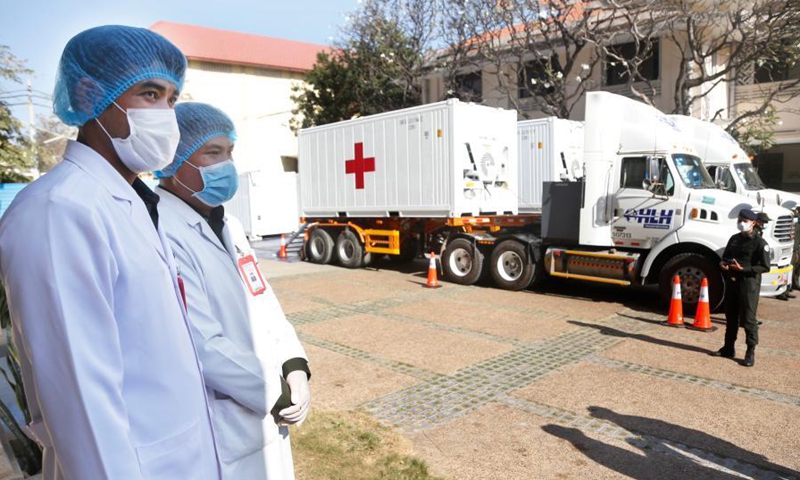
Cambodian medical staff stand near refrigeration vehicles at the Preah Ket Mealea Hospital in Phnom Penh, Cambodia, Feb. 3, 2021. A team of Chinese vaccine specialists have provided training to Cambodian medical staff on how to use the anti-COVID-19 vaccine ahead of its arrival.Photo:Xinhua
Several Chinese nationals escaping from a designated quarantine hotel in Cambodia have reportedly caused a snowball effect.
The country has reported 302 COVID-19 patients in the wave of the recent community outbreak as of Sunday, of which at least 210 are reported to be Chinese, local media said.
This has pushed Chinese communities in Cambodia to the brink to some extent. Cases of Chinese being castigated or being ejected from public venues have happened occasionally since the outbreak, said Chinese nationals who lives in Phnom Penh.
The reckless behavior was criticized in both Cambodia and China, with the Chinese Embassy in Cambodia urging Chinese residents in the country to obey local laws.
The two neighboring countries have shown supports to each other during the COVID-19 pandemic. Observers noted that these recent events would not affect the main friendly and cooperative ties between the two.
Irresponsible actionsAccording to the Khmer Times, in mid-February, four people broke the quarantine rules, bribed security guards at a designated quarantine hotel, and visited a nightclub, which was believed to have started the cluster of infections. Of the four, two tested positive for COVID-19.
Although the original report did not name the four people as Chinese, a statement from the website of Chinese Embassy in Cambodia on February 20 said that "certain Chinese citizens, upon arriving in Cambodia, violated the rules and left the quarantine hotel," and that some purposely went into hiding and avoided treatment after testing positive.
Their blatant violation of the rules has sparked outrage among the Cambodian public as well as the Chinese residents in the country. On February 18, the Cambodian government issued a sub-decree imposing stiffer fines for people caught flouting COVID-19 quarantine rules.
Subsequently, between the periods of February 20 to 23, 80 COVID-19 infections among Chinese nationals living in Phnom Penh were reported.
A Chinese resident in the city who works in the media sector surnamed Lu explained that "The incident of Chinese nationals breaking the anti-prevention rules was reported exactly two days after the strict sub-decree."
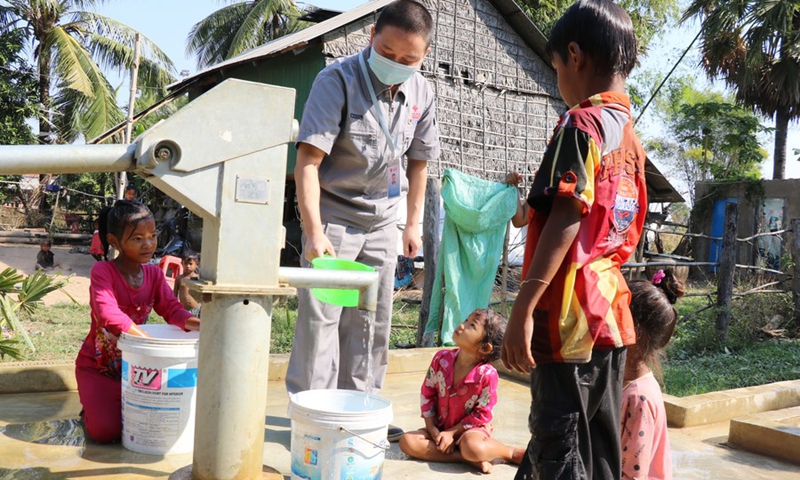
A Chinese engineer examines a new well constructed under the Phase II of China-aided rural water supply and rural road projects in Cambodia in Kampong Speu Province of Cambodia, Jan. 15, 2021.(Photo: Xinhua)
"This led the Cambodian public to believe that these Chinese had deliberately ignored the country's latest policy," he said.
"The Chinese nationals escaping from the hotel do not have close relations with the local Chinese community," Lu revealed. "Most of them had just arrived in Cambodia from a third country, and their behavior has been condemned by the local Chinese community."
However, the incidents have already earned the Chinese community in Cambodia a bad reputation, also prompting attacks from other parts of the world.
A few Western media outlets, including some in France and Canada, have openly pushed arguments such as "the Chinese have ruined Cambodia's pandemic prevention," the Global Times found.
They appear eager to conduct a smear campaign against China, with careless rhetoric igniting a vicious blame game that's seen the Chinese community in Cambodia being blamed squarely for the current outbreak.
The latest community cluster in Cambodia has unfortunately also become an opportunity for anti-China forces to tarnish China's reputation, maliciously stirring up xenophobic sentiment toward China among the Cambodian public, said experts.
Keeping a low profileThere have been cases of Chinese nationals being banned from entering restaurants these days, Lu said.
Chinese communities in Cambodia, therefore, "have been keeping a low profile" to "stay away from troubles," Lu told the Global Times.
"We seldom go out," he said. "Many Chinese-owned restaurants and stores suspended their business to avoid possible rumors and attacks."
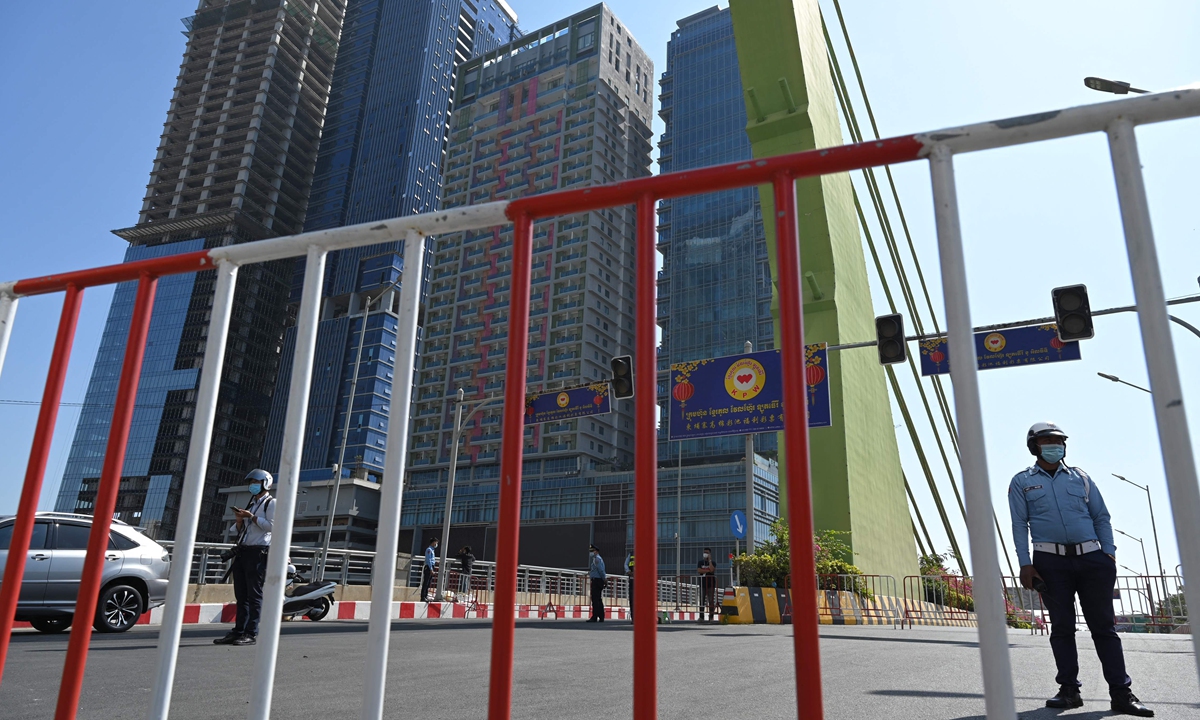
Cambodian police stand guard as they lock down a bridge to the Koh Pich district in capital Phnom Penh on Saturday, after authorities found 32 local cases of COVID-19 infections. Photo: VCG
There have been no incidents of mass discrimination against Chinese nationals so far, as "the Cambodian government has been working on proper public opinion guidance," Lu added.
Cambodian Prime Minister Hun Sen on Saturday called for people to follow pandemic control protocols and not to discriminate against Chinese nationals, the Khmer Times reported that day.
In Phnom Penh, authorities have reportedly ordered the closure of all local schools for two weeks due to the virus' resurgence. Many details of the cluster infections are yet to be revealed, nor is there an obvious inflection point in sight.
"The most important task now is to stop the further spread of the epidemic," said Zhang Zhenjiang, an expert on Southeast Asia Overseas Chinese studies at Jinan University in South China's Guangdong Province, calling for the Cambodian society and the local Chinese community to abandon prejudices and unite to complete the needed contact-tracing of the pandemic.
To further prevent the spread within the local community, the Phnom Penh Police Department has added nearly 300 police officers in 14 districts to assist health personnel with pandemic prevention and control, as well as to bolster security at designated quarantine sites.
On Thursday, the Prime Minister's Office issued a resolution that stipulates that foreigners who do not comply with the pandemic prevention regulations may be forcibly deported.
"The Chinese community has contributed a lot in local COVID-19 prevention and control efforts," said Zhang Wei, director of a Chinese travel agency based in Phnom Penh. Lots of Chinese-invested companies reportedly donated virus-fighting materials, including tens of thousands of urgently-needed masks, Zhang said.
China Three Gorges Corporation, which runs two hydropower plants in Cambodia, said it strictly abides by the Cambodian government's virus prevention regulations and has been administering nucleic acid tests to all of its employees in Cambodia monthly.
In 2020, the company donated $10,000 to the Cambodian Red Cross for the purchase of personal protective equipment (PPE) for locals, helping the Cambodians combat the COVID-19 pandemic, according to a statement sent to the Global Times by the company on Thursday.
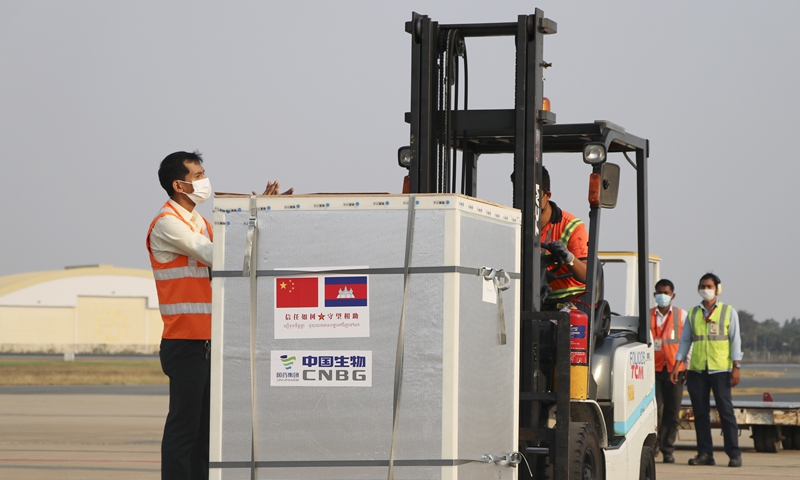
Workers transfer the China-donated Sinopharm COVID-19 vaccines at the Phnom Penh International Airport in Phnom Penh, Cambodia, Feb. 7, 2021. A chartered flight carrying the first batch of the China-donated Sinopharm COVID-19 vaccines arrived in Cambodia on Sunday, welcomed by Prime Minister Samdech Techo Hun Sen at the Phnom Penh International Airport. (Photo by Gao Bingnan/Xinhua)
Supportive effortsA handful of people's violation of rules has set back Cambodia's anti-virus prevention efforts. Their behavior has been condemned by both Cambodians and Chinese citizens.
The actions not only brought great challenges to Cambodia's pandemic prevention work, but are also suspected of violating relevant local laws, said the Chinese Embassy in Cambodia after the event.
"The Chinese Embassy in Cambodia strongly urges Chinese citizens in Cambodia to strictly abide by the Cambodian government's pandemic prevention regulations, and cooperate with the Cambodian health authorities," read a statement issued by the embassy, noting that citizens must not withhold information or abscond if they display COVID-19 symptoms.
Chinese observers believe that the latest virus outbreak won't adversely affect the Sino-Cambodian relationship. "Neither COVID-19 nor anti-China forces behind it can prevent our friendly ties from moving forward," Zhang Zhenjiang told the Global Times.
Moreover, the two countries have continued to support each other during the COVID-19 pandemic.
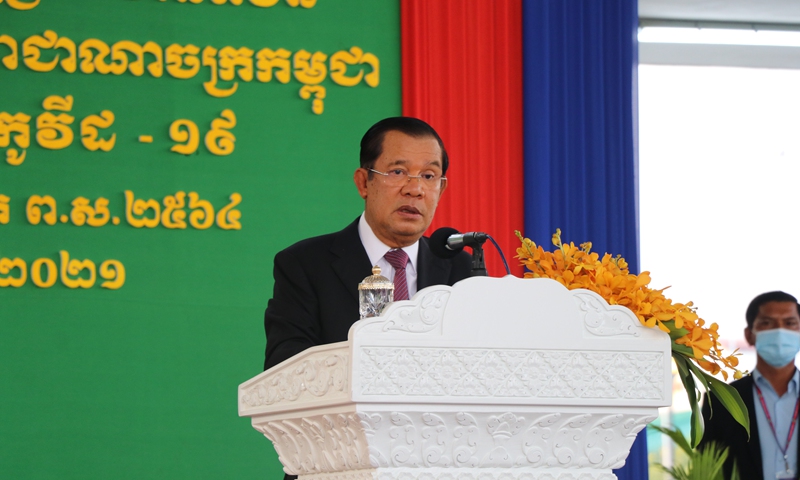
Cambodian Prime Minister Samdech Techo Hun Sen speaks during the handover ceremony of China-donated Sinopharm COVID-19 vaccines at the Phnom Penh International Airport in Phnom Penh, Cambodia, Feb. 7, 2021. A chartered flight carrying the first batch of the China-donated Sinopharm COVID-19 vaccines arrived in Cambodia on Sunday, welcomed by Prime Minister Samdech Techo Hun Sen at the Phnom Penh International Airport. (Photo by Gao Bingnan/Xinhua)
Cambodian Prime Minister Hun Sen visited China in February 2020, when China was hardest hit by the virus.
The Chinese Embassy in Cambodia announced on February 23 that the embassy urgently donated 100,000 medical facial masks to Phnom Penh government to aid in the fight against the third community outbreak.
In early February, China delivered the first batch of 600,000 doses of Sinopharm's COVID-19 vaccine to Cambodia.
Cambodian authorities have authorized the emergency use of Sinopharm COVID-19 vaccine in the country, noting that "the vaccine is used safely in China and other countries."








